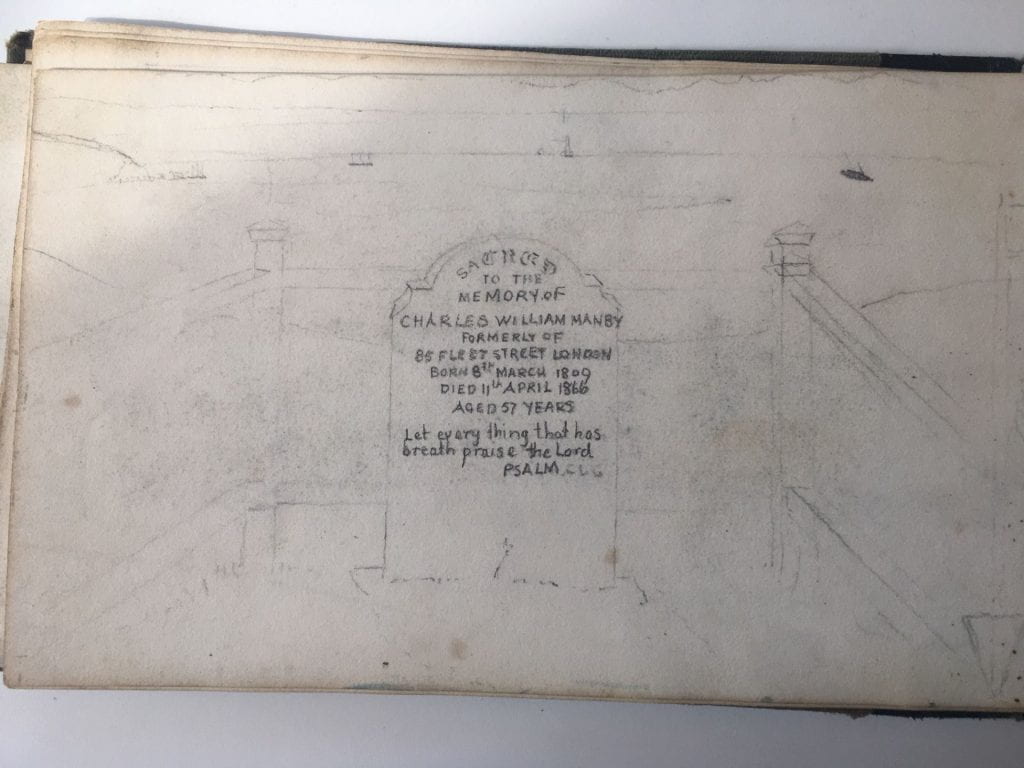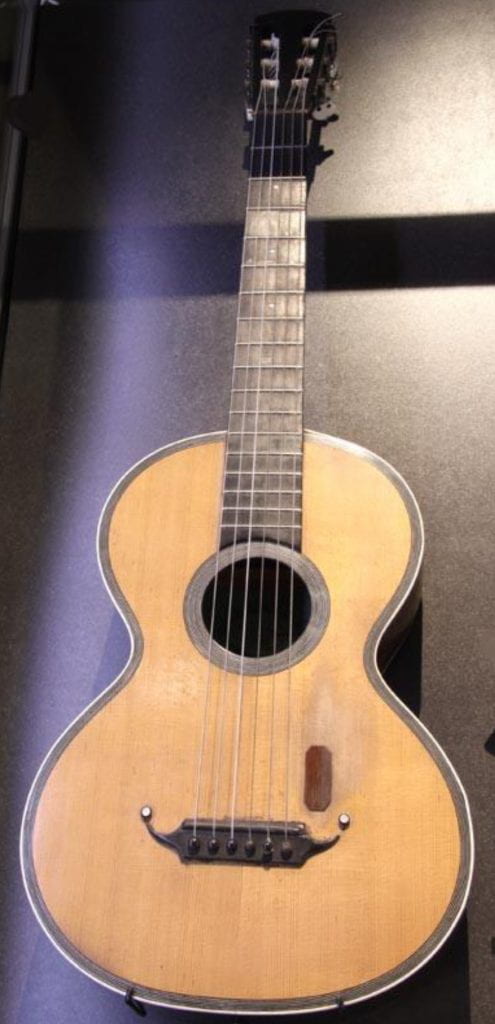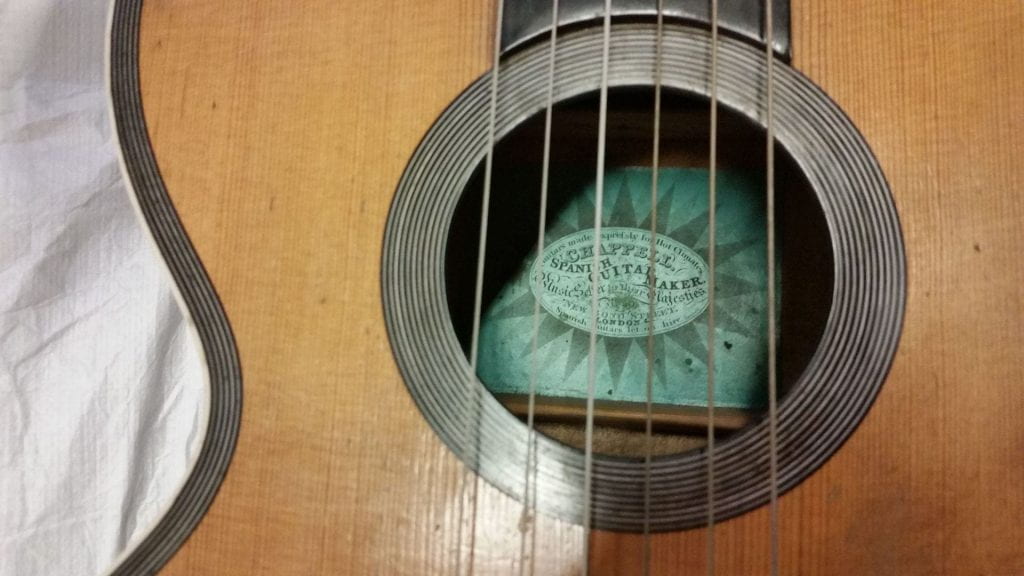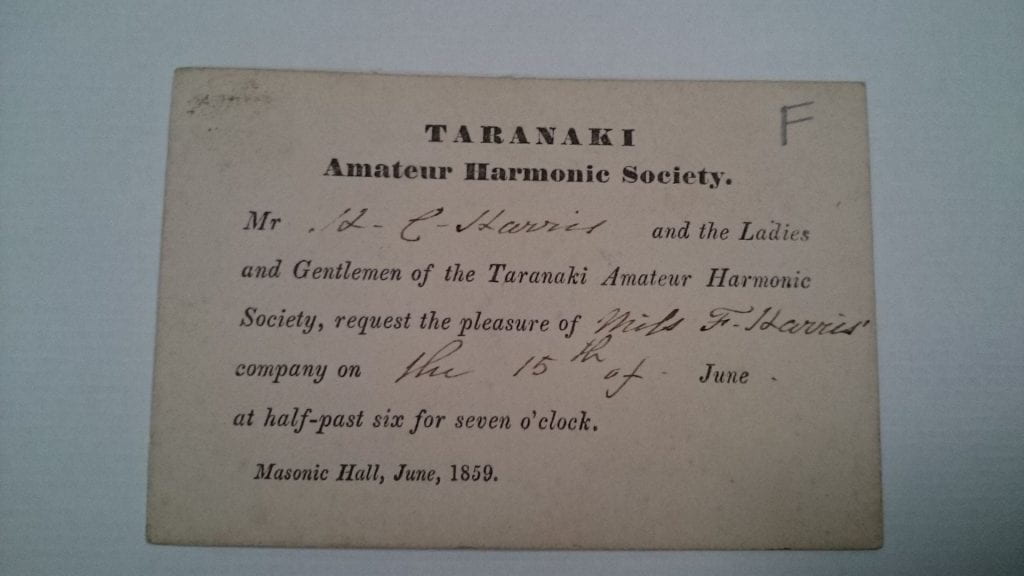By Michele Leggott

The inscription on the headstone in Edwin Harris’s pencil sketch reads: ‘Sacred to the memory of Charles William Manby | Formerly of 85 Fleet Street London | Born 8th March 1809 | Died 11th April 1866 | Aged 57 Years | Let everything that has breath praise the Lord | Psalm CL:6.’ The drawing is one of four headstones Edwin sketched and carries the clearest identification of the person buried beneath the stone. Who was Charles Manby and why did his memorial in Wakapuaka Cemetery engage Edwin’s attention? To answer these questions we need to go back to Taranaki and the arrival of Manby and his wife Beatrice in New Plymouth in 1857. The ebullient Manby was bringing not only musical culture to the settlement but instruments on which to play it:
Music. Mr C. W. Manby Professor of Music, HAS the honor of announcing that he will be ready to receive Pupils on the arrival of the Kenilworth. Mr Manby will be happy to enter into preliminary arrangements with any lady or gentleman who will favor him with a call. Mr Manby wishes all his pupils to undertake the theoretical part in combination with the practical part of the science. Mr Manby will be happy to offer for sale a splendid Semi-Grand Pianoforte, by Oetzman, with double repeater action, in plain Mahogany case ; and an Elegant Rosewood Piccolo Pianoforte, with patent check action. Mr Manby is residing, pro tem., with Mr Burton Lawrence, Brougham-street. Pianofortes tuned and repaired. (Taranaki Herald 23 May 1857: 1)
The Manbys were soon installed at Arundel Cottage on Carrington Rd opposite the barracks on Marsland Hill. The following year Manby set up a Harmonic Society, mostly comprised of his music students. The society’s first concert in June 1858 featured solos on the harp, violin and piano. A stoush with the press who reported less than favourably on the quality of the young society’s concert offerings provided entertainment in the correspondence columns of the Herald in October. In 1859, Manby announced that he would form and train a band for the Taranaki Volunteer Rifles, promising that it would be fit to play in public within 12 months if members attended to their practice commitments, and an order for instruments was dispatched to London. A poem appeared in the Herald in May under lightly-disguised initials ragging the settlement’s primitive time-keeping arrangements and urging harbourmaster Watson to do something about them:
AN APOSTROPHE
Friends-Countrymen and Lovers! what’s to be done!
Has Mister Watson squabbled with the sun ?
Why is New Plymouth but a timeless spot ?
Is it not worth powder — let alone the shot
The Pa’s great gun why doth it weekly trounce
Saturday out of its mid-day bounce ?
Is that great gun waiting till its debts are frightful
To make its “going off” the more delightful ?
Must all New Plymouth be a laughing stock,
Not a man within in knowing ” what’s o’clock ?
Must Jones who dineth as he hopes at” one,”
Come home too late and find his dinner gone
Must lovers perish from this timeless bother,
Meeting disappointment — and not each other ?
Must legs of mutton boiling in the pot
Protest they’re done, when ” Missus ” knows they’re not’
Must Moses who stands hard for twelve o’clock
Suffer a pecuniary shock,
Finding that to morrow’s not begun
And foreclosed mortgages— expensive fun
Must all this happen— dreadful though it be
And no man find a present remedy
Our red-coat friends, indeed, have partly cured the ill
By hoisting up a most extensive pill,
But then, alas ! the military sinners,
Up flies their signal just when they want their dinners.
Rouse Watson Rouse ! A sight! A sight!
Up with your sextant ! Set New Plymouth right !
Take the old sun — and shake him if you will,
Do anything but let our clocks stand still.
Cram the old gun ! Boldly blaze away,
Scale every watch into the right time of day.
And ye, too, Thompson, Brown, and Jones & Smith,
Draw your purses, like Englishmen of pith
Subscribe for powder— make a decent pay,
And have Noon blazed out every day.
All men then will truly come to time
And I wont scribble any further rhyme,
—Communicated. M. W. C.
(Taranaki Herald 28 May 1859: 3)
Enter the musical Harrises. Edwin was reported playing guitar and flute on the William Bryan’s voyage to New Zealand in 1840. He was in the choir of St Mary’s at its inception in 1846. A letter to his father in England in 1845 requests a set of guitar strings: ‘I have made a guitar, Music being our only amusement. The evenings are long, lights bad for drawing and books only for those who can get them..’ In 1860 Emily observe’d Edwin’s concert harp being transported by cart through the streets of wartime New Plymouth and the harp turns up again in one of her letters from Hobart: ‘I wish I was with you now as I suppose that you are all at home tonight, perhaps you are having a nice little supper now or papa is playing the harp.’ Other physical traces of the family preoccupation with music and singing survive in the Harris collection at Puke Ariki. Of particular note is a Chappell Guitar and two well-used music books, Fifty Songs for the Voice and Guitar (London: Musical Bouquet Office, [1851-1861]) and Giovanni Luigi, Chappell’s Instruction Book for the Guitar (London: Chappell and Company, [c.1858]).


The Chappell guitar belonged to Edwin’ and must have been acquired when the family finances were in better shape. While we can’t be sure that Manby’s entrepreneurship extended to supplying the musical needs of Edwin Harris and his family, it’s not a bad guess. The Chappell Brothers business in Bond St, London, is not far from the music-selling business Manby operated in Fleet St before emigrating to New Zealand. Perhaps the Harris guitar, harp and music books were imported from London by the energetic and well-connected Manby. Two other connections bring Charles Manby and the Harrises into alignment. The first is an invitation to Frances Harris from her brother Corbyn to attend the Harmonic Society’s concert in June 1859. We can assume that Corbyn is a performing member of the Society, and if the card has been filled out by him, it constitutes the sole surviving trace of his handwriting.

The second link to Manby concerns Corbyn’s funeral at St Mary’s 31 July 1860. From newspaper reports we know that the Volunteer Rifles Band was part of the ceremony, but it is the eye-witness accounts of Harriet Halse, a young married woman, and Robert Clinton Hughes, a 13-year-old schoolboy, that bring the emotion of the occasion right up close:
Tuesday 31st. Poor Corbin Harris’s funeral took place to day. A great number of volunteers and militia followed and military. Wiremu was one of the firing party of volunteers. The volunteer band played the Dead March beautifully and returning they played a beautiful melody of Moores (When sorrow thy young life shadeth). (Halse diary)
July 31, 1860
The body of Corborne Harris was buried today. The Volunteer band played the funeral to the church. It was followed to the grave by a long train of mourners and the father of the unfortunate young man was led to the grave when the coffin was let down, he looked quite imbecile but his grief was too great to be alleviated by tears. (Hughes diary)
Manby is there, conducting his band; Emily is there, one of the figures supporting her father at the graveside. Sarah Harris and her other daughters are far away in Nelson. Perhaps it is not surprising that Edwin’s association with Charles Manby persisted through the years of their mutual relocation to Nelson, Edwin to teach drawing at the Bishop’s School, Manby to teach music at Nelson College and once again set up musical instruction for young and old:
Singing Classes. Mr Manby will be glad to meet a small party of Ladies and Gentlemen disposed to join in the formation of a practice class for the study of Vocal music. Names to be left with Mr. Stanton, Trafalgar street, or with Mr. Manby, at his residence, Hillfield House, Bronti-street. (Nelson Examiner 12 June 1861: 1)
Lead writer: Michele Leggott
Research support: Brianna Vincent, Makyla Curtis